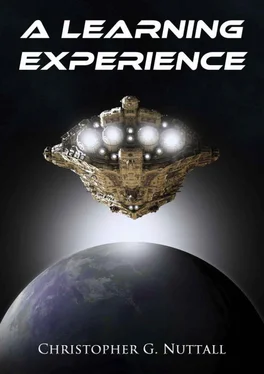“Start looking for somewhere else, then,” he said. “It will be years before Mars or Venus is ready to serve as a training camp.”
“I’ve been making enquires,” Romford said. “Panama is a possibility — quite a few of my team have great memories from Panama — but we’d have to pay out a shitload in bribes. I don’t see anywhere in Europe accepting us, at least not without a fairly hefty quid pro quo — maybe additional fusion reactors. Right now, if we are restricting ourselves to democracies, we may be restricted to Australia. They’re quite interested in hosting one of our camps.”
Steve gave him an odd look, so Romford explained.
“They’re nervous about troubles spreading over from Indonesia,” Romford explained. “If we want to put a camp there, they will be quite happy with it in exchange for assistance if they need it. There will be a few basic rules, but no real difference from what we have here.”
“I’ll speak to Komura,” Steve said. “He can open discussions.”
He shrugged. “Have we had any problems that might give them pause?”
“A couple of bar fights,” Romford said. “One of our guys was called a baby-killer, so he hauled off and punched the bastard… and everything went down from there. Another guy was set upon by a group of thugs and defended himself admirably. Other than that, no major problems. I have made it clear that American law runs outside the fence and if anyone gets into trouble with the law we won’t get off our asses to do anything about it if they’re guilty.”
“Good thinking,” Steve said. “We don’t want another rape case.”
His father, he recalled, had ranted about a rape case in Okinawa, where an American serviceman had raped a local girl. The bastard should have been strung up by his testicles, Steve’s father had thundered, or handled over to the locals as soon as his guilt had been established. No matter the outcome, it had discouraged the locals from wanting to keep the American military presence.
And if one of my men do something like that , Steve thought, coldly. He’d damn well pray that the local government gets to him before me .
“Quite,” Romford agreed. “Not that that will be a problem, Steve. There are four new brothels in town.”
Steve snorted. “Why am I not surprised?”
“The men have their new immune boosters,” Romford said. “They can fuck an AIDS-infested whore from Tijuana and they won’t be in any danger of actually catching anything. Or pregnancy, for that matter. We’ve given just about everyone — particularly the women — contraceptive implants, just to make sure there’s no risk of pregnancy. But we may want to set up a brothel on Ying or another alien world.”
“Maybe,” Steve said. “What do the aliens think of it?”
“I went through their contracts,” Romford said. “I don’t believe they would have any objections, as long as it didn’t interfere with military matters. We have quite a lot of freedom to determine how best to handle our affairs.”
Steve nodded. If two different human cultures could have different requirements, how much harder would it be for two alien races to live by the same rules? There were races where one sex was unintelligent, races that had more than two sexes, races that laid eggs and didn’t have sex as humans understood it, races that had sex anywhere and everywhere they could… and that was only one tiny aspect of the whole. What would happen when there were different religious requirements? Or food and drink? At least food professors could produce something edible to humanity, even if it didn’t always taste nice. But that was just a matter of programming.
“Make sure you don’t compromise our combat effectiveness,” he said. “Other than that, make whatever arrangements you like.”
He accepted an invitation to walk through the combat simulator and marvel at just how perfect a simulator it actually was. A combination of holographic images, force fields and gravity wave generators allowed the system to reproduce almost any combat environment, from urban-style warfare to operations in outer space. And the simulator computers tracked the whole system so perfectly that there was no need for proper umpires.
“We actually programmed the teleporter to yank anyone out if they’re recorded as dead,” Romford explained. “In high-intensity operations, anything tough enough to burn through a suit will very definitely kill the person inside. Low-intensity operations are probably not going to be part of our work, but we train for them anyway. One major problem is that we have little room to deploy medics. And even if we did…”
Steve winced. Humans were humans under the skin, but aliens could be very alien. Perhaps that explained why the aliens had produced autodoc systems and other automated forms of medical care; there weren’t any doctors who were capable of moving from a patient of one race to a patient from another. The movie where an alien had been dissected by a vet might have been quite realistic after all.
“We should try to avoid such operations,” he said, although — not being a politician — he had no illusions about the prospect of switching from high-intensity combat to low-intensity in a heartbeat. “If we do, try to keep civilians out of the fighting as much as possible.”
Romford gave him a sharp glance, then nodded.
Steve reviewed the rest of the base, then teleported back to the starship to catch up on his briefings. Heinlein had expanded rapidly, to the point where two hotels had been constructed and regular tours were running from the colony to the various tourist attractions on the moon, while other tourists were being lined up for trips to Mars. Each of them was paying a substantial price for their tickets, which was going right back into the economy.
“We may well have solved the economic crisis,” Wilhelm said, after he’d finished talking about the new technology he’d introduced on Earth. “Right now, literally trillions of dollars worth of currency is moving around the world, thanks to us.”
“Good,” Steve said. International finance had always been a closed book to him, but he was prepared to accept Wilhelm’s word that more money moving around was a good thing. “Are there any problems? Or are we causing any problems?”
“It depends,” Wilhelm realised. “You know there’s a shortage of plumbers?”
Steve shook his head, not seeing the point.
“Space habitation involves a lot of plumbing,” Wilhelm said. “So we’ve been hiring plumbers — and other outfitters — at a terrifying rate. The net result is that we have driven down the number of plumbers available elsewhere.”
“Oh,” Steve said.
Wilhelm shrugged. “We’ve got several training camps up and running for newcomers, so I think this problem will eventually restore itself,” he said. “We may also have solved the education bubble.”
He snorted. “We don’t care about professional qualifications,” he explained, when Steve looked puzzled. “So we’ve been taking college-age students, exposing them to some proper training, then selecting the best. Our wages are high, so they can start paying off their debts in good order. Given time, maybe we can defuse that particular problem before it actually explodes. On the other hand, we have quite a few idiots who majored in Women’s Studies trying to learn which end of a screwdriver is the one they shouldn’t stick in an electrical socket.”
Steve frowned. “And are they actually learning something useful?”
“Oh, yes,” Wilhelm said. “We came up with some pretty graphic training videos to make it clear to them that mistakes would be harshly punished by the universe. And we made them all read The Cold Equations and write essays explaining how a series of minor bureaucratic oversights led to tragedy. Quite a few of them quit after reading the story.
Читать дальше












